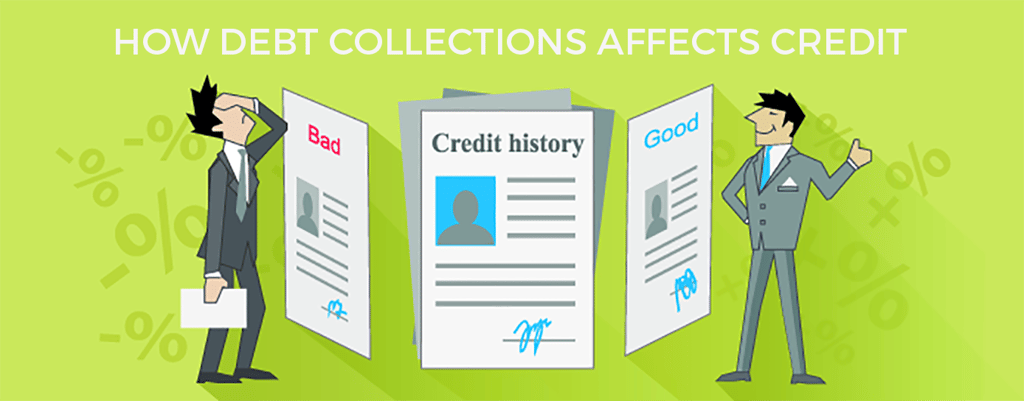
Credit and credit scoring can affect buying or leasing a house or car, getting a student loan or credit card, or in some cases, getting a job. Creditors, lenders and property owners may have different policies on when they send an account to collections, but having an account in collections could affect credit. In some cases, information found on the credit report is false. Also, what happens when the debt has been paid off?
Here is how debt collections affects your credit score.
When is an account sent to Collections?
Generally speaking, after 30-90 days, the original creditor will attempt to collect what is owed before passing the account to collections. Depending on the type of debt, the creditor or lender, the amount of time past due and other things, an account is typically sent to collections once it is considered significantly overdue. At that point, the original creditor may write off the debt (charge-off) and contract (or in some cases, sell it) to a collections agency. With the original creditor's approval, the collection agency will then inform the credit reporting bureaus that the account is in collections.
Typically, a credit card debt is sent to collections at 180 days past due. Medical debt reporting has been recently overhauled, now extending to 180 days before being reported on credit reports to allow time for the processing of insurance payments. With tenant collections, there are dependencies including if the tenant is still in the property or accounting for the agreed-upon payment terms in the lease agreement. Reading the "fine print" of any credit or financial agreement will generally list these terms.
See also: What to expect when my account is in collections
What happens to my credit when an account is in Collections?
Payment history makes up about a third of your credit score so even before your account goes to collections, your credit score could drop quickly at 30 days past due. The factors that affect your payment history include:
- The types of accounts
- The amount owed
- The amount of time past due
- Number of past due accounts
When a creditor writes off your account as a 'charge-off', your credit score drops dramatically. When the account is moved to collections, it drops even more. A charge-off remains on your credit report for seven years but as you keep other accounts current, the impact lessens over time.
The amount a credit score drops also depends on how high your score was before the collections was added to your credit report. It is important to note that credit reporting isn't mistake-free. A consumer has a right to a yearly free credit report to ensure that accounts and payments are being recorded correctly. Collections, charge-offs and bankruptcies that show up on credit reports can greatly affect your ability to get loans, credit, housing, and employment.
if i pay the collections, does my credit improve?
Many assume that paying off a collection would improve a credit score however the effect isn't immediate. The collections still shows up on a credit report for 7 years. The good news is that once the debt is paid, there is a lesser chance that the debt would be sold to another collections company and show up as another collections on your credit report. Although paying off the collections may not immediately improve your credit score, it may improve your creditworthiness when a lender is reviewing your report.
Knowing your credit score and requesting a yearly copy of your credit report is another way of repairing your credit. Credit scores change all the time and each major credit reporting agency may have a different score. Keeping other accounts current, even with a minimum payment, is one way to improve credit with a collections on your report. Communication with creditors is key when unexpected financial troubles arise.
Creditors do have a right to attempt to collect what is owed. Consumers also have a right to not be deceived or harassed during collection attempts. Debt collectors must inform consumers who they represent and the correct amount of the debt. The Fair Debt Collections Practices Act informs consumers of their rights against illegal collections tactics.
See also: What is the FDCPA and How Does it Protect Consumers?
What if the credit information is False?
Your credit reportmay have errors unknown to you until you attempt to get a loan or other credit. Consumers have a right to file a dispute with the credit reporting bureau if the account in collections is false or outdated or if your personal information is incorrect. If a collections remains on your credit report for seven years past the date of delinquency, you can request that the credit bureau remove it. If you find incorrect information with regards to other non-collections accounts, you may also contact the creditor directly to have the report corrected. The information on the credit report should be repaired within 30 to 45 days. Remember to follow-up after filing a dispute.
If you have already received a free credit report for the year, but have been denied credit, housing or employment due to something on your credit report, you may request another copy under the Fair Credit Reporting Act.
Financial difficulties can happen to anyone. Communicating and working with creditors to maintain a positive account status is one way to keep your credit score in check. Keeping a close eye on your credit, because of identity theft, false or outdated credit information, is another way to stay ahead of your credit score affecting your rights to credit, housing or a great job.



